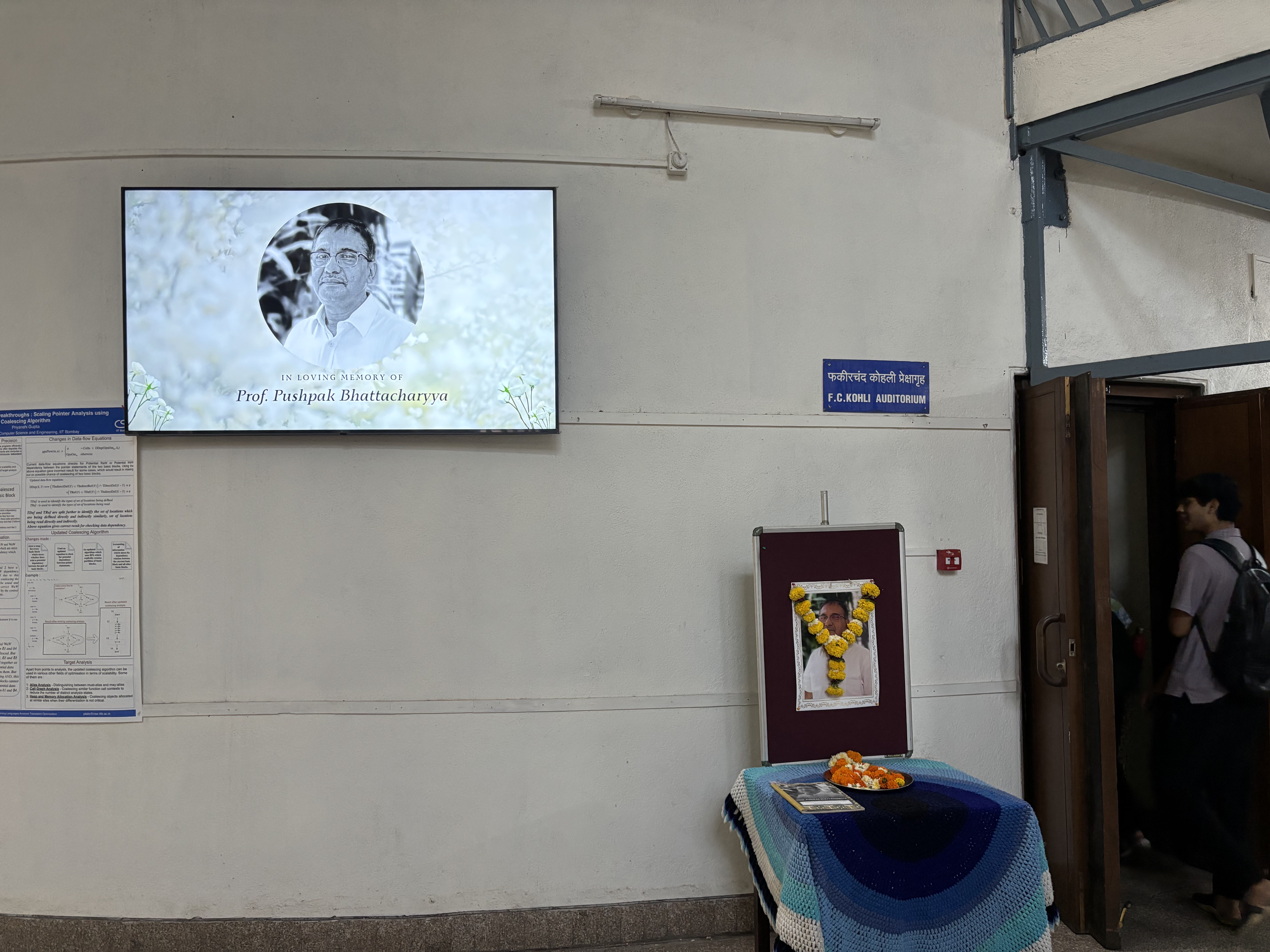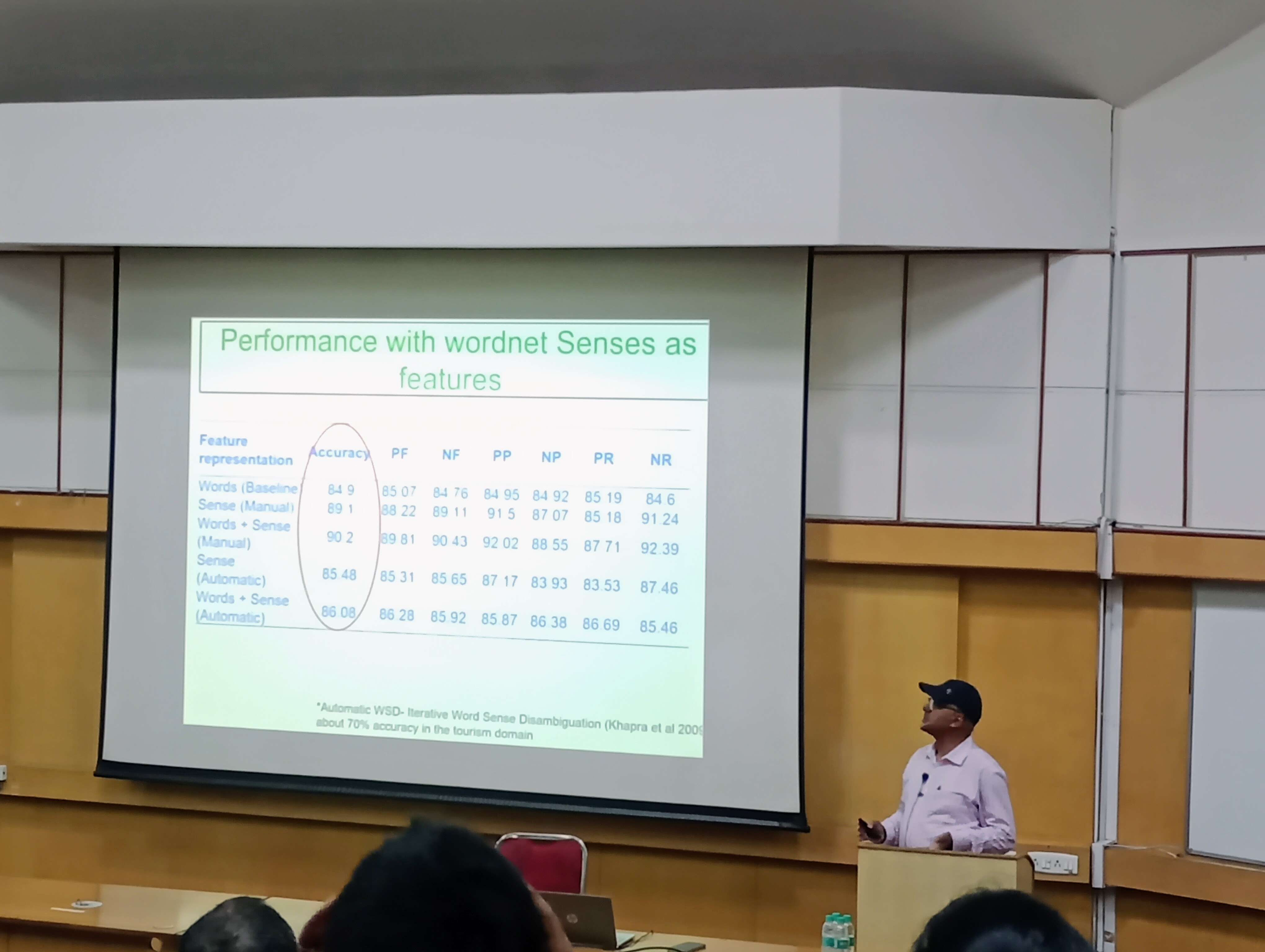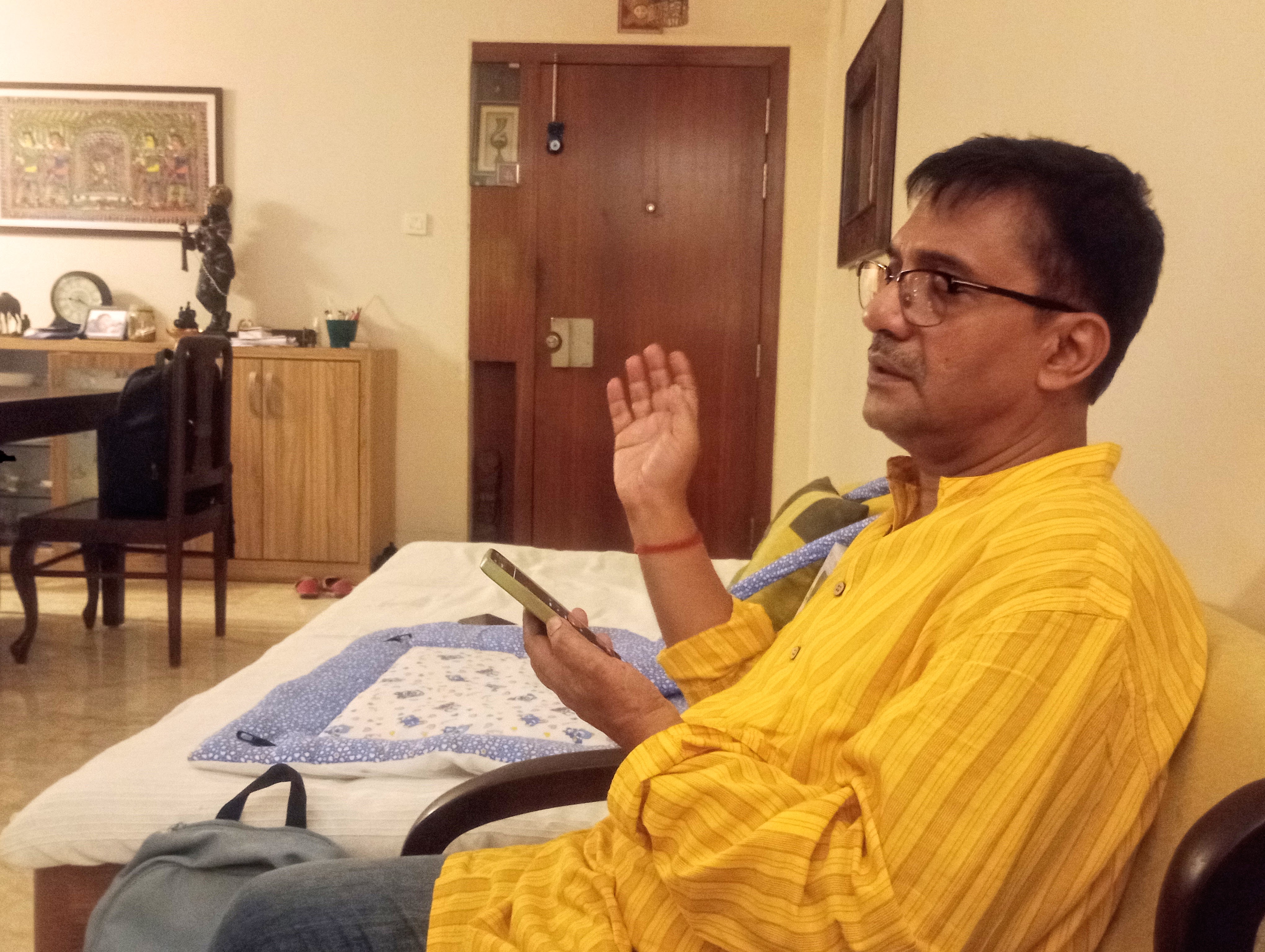Memories





ইন্দ্রপতন
I hardly had any knowledge about IIT, JEE, or what engineering entailed before coming to IIT. While interning at ISI, I discovered the world of Computational Linguistics, and names such as Prof. Pushpak Bhattacharyya began popping up often. Often, linguists would quote him, and we would find ourselves in awe without fully knowing the greatness of the man or who he was exactly.
One of our illustrious teachers, Prof. Niladri Sekhar Dash, was a close associate of his and had even co-edited a book on WordNet and collaborated with him on other projects.
I applied for admission to IIT Bombay and found the person I had aspired to have as my guide: Prof. Malhar Kulkarni, whom I had heard about and briefly met in an online seminar. Another attraction of coming here was the hope of seeing the giant personality—Prof. Bhattacharyya—whom I had heard so much about.
Prof. Kulkarni told me that there might be chances to interact with him as part of our work. While selecting courses for the compulsory PhD coursework, I noticed a course titled CS626: Speech, Natural Language Processing and the Web taught by Prof. Bhattacharyya. I emailed him to ask whether I could take the course (I was apprehensive, coming from the humanities and having left mathematics after twelfth grade). He replied in the affirmative:
"Yes, you should do this course. It will be a mix of Linguistics and Probability."
His reply was much like the person himself: no-nonsense and oriented toward work, a trait that became clear with time. I was excited to learn, and even more excited to see him in person. At first, he taught online (I later learnt that a family bereavement required his absence from campus). When he did come to class in person, I would watch him with rapt attention; my enthusiasm was perhaps more intense than that of many classmates, for whom a course often equated only to marks.
Through his classes I learnt the ABCs of NLP and what computational linguistics truly meant. I was probably the only student from the humanities to pass the course. Throughout the term, I observed his class routine carefully: he arrived early, prepared his laptop and presentations, and—despite occasional lateness caused by a long commute—conducted each session with calm precision.
His slides were plainly designed but rich in content—neither over-designed nor under-detailed, containing precisely the information needed. His voice, calm yet firm over the microphone, registered quickly in our minds. As the course progressed, the mathematics sometimes confounded me; looking back, I wish I had fortified my fundamentals in probability and statistics to reap more from his teaching. I regret not being able to take his Deep Learning and NLP course later; though I attended several of its early classes, the course became progressively harder and required prior knowledge of basic machine learning.
What most appealed to me was his composure. In the initial days I bombarded him with questions—sometimes silly ones—perhaps driven by my desire to interact with him. It turned out he had mastered not only NLP, AI, and ML, but also linguistics, giving his work the depth it needed for the significant contributions he made.
He often said, "Linguists and Computer Scientists should work hand in hand". He was among the few who not only spoke of this with conviction but also practiced it in reality.
Needless to say, the diligence, the discipline, the grey matter was hereditary as his father, Shri Prathamesh Bhattacharyya, was a chemistry graduate from Presidency College, Calcutta, which was at its peak in those days. His grandfather, Shri Purnachandra Shastri, was a Sanskrit (oriental) scholar of such repute that there is a road in Shillong after his name. His son, too, carries the family legacy.
Prof. Pushpak Bhattacharyya studied at Jail Road Boys High School, Shillong, from which he was trained in his military discipline. We can clearly infer his brilliance as a school student from his academic records starting from his graduation years. He studied in three IITs -- B.Tech. in Electrical Engineering from IIT Kharagpur (1984), M.Tech. in Computer Science and Engineering from IIT Kanpur (1986), Ph.D. from IIT Bombay (1993). In 1990, even before he had completed his doctoral studies, he was appointed as an Assistant Professor at the same institute. One can write at length about his achievements and the positions of responsibility held by him, which would go for pages, but one out of them, if not mentioned, would make it incomplete, is his Directorship at IIT Patna from 2015-2020, which was a shining feather in his cap. He handled such a respected and demanding responsibility with ease, and besides establishing an NLP lab there at IIT Patna, also co-taught courses side by side with Prof. Aif Ekbal, a rare feat for a Director of as big an institute as IIT. Post his directorship, he returned in 2020 and resumed his duties as a full-time researcher, serving in administrative as well as academic functions in the institute, heading several governmental committees, editor of journals, committee member of conferences, and being on the board of several international endeavours.
It would also not be out of place to mention a little about his family. To begin with, Dr. Raunak Bhattacharyya, the genius son of a genius father, did his entire schooling from the IIT Bombay campus school, followed by B.Tech. from IIT Bombay, scoring 9th in JEE. He pursued a master's from Georgia Tech and a PhD from Stanford, rounding up with a Post Doc from Oxford University. He is now serving as a professor at the School of Intelligence, IIT Delhi. He plays the tabla and is so unassuming that one can mistake him for being as ordinary as anyone, which he certainly is not. His wife, Dr. Aditi Bhattacharyya, is also a well-accomplished urban planner and a professor at the Vivekananda Education Society College of Architecture. Apart from having a Master's degree from the National University of Singapore, and having worked with Oxford County, she is also a sitar player and is continuing with the instrument, due to the encouragement given by Sir.
I first met Sir's wife, Mrs. Aparna Bhattacharyya, a kind and sweet person, and a soft-spoken, loving lady when they had come to receive me on the day of Diwali in 2023, as Sir's driving licence had expired and Ma'am had to drive all the way just to receive me from my hostel which is at the fag-end of the IIT Bombay campus. When we were driving back to their apartment in Chandivali, it took us about thirty to forty minutes since there was a bit of traffic, and that's when I realised that they had spent quite an amount of time on that festival day going back and forth to bring me from the hostel, when they could have spent it celebrating at home. While I was coming back, I insisted on taking an Uber back, but again, his son drove with Sir by his side and dropped me back at my hostel. Even though Sir had fewer chances of being caught by the traffic police for his licence having expired by a few days, he chose not to drive, as his sense of duty and law-abiding nature didn't let him. His car with an IITB logo and who he was could have easily managed to dispel any minor problem that might have arisen, yet he was a good Samaritan who never took undue advantage of any situation. Coming back to Ma'am, she is a teacher of biology at a school and has also been a dedicated Odissi dancer for many years now.
It was at his house that I played Puriya Kalyan in Teentaal, accompanied by Raunak Dada on Tabla. Sir sang a Rabindra Sangeet and also played a few on his TV while lighting lamps. The funny part was when he tried to use his remote for a voice search for a Rabindra Sangeet, the search didn't work; quite funny for a person who did NLP! He said that he liked Kanika Bandyopadhyay, Subinoy Roy, and a few other names. He sang a Shyama Sangeet too. The sweetest thing that lingered along was the grandson, such a quiet baby of some months, who didn't have any complaints and was supposedly liking the music. We had a bit of chit chat followed by a few crackers, and we moved on to dinner, which had Chola-Bhatura, which both the Ma'ams had prepared so lovingly.
I was lucky enough as Prof. Bhattacharyya asked me to present a talk as a part of the lecture series organised by his C-FILT (Computation for Indian Language Technology) Lab. He introduced me with the kindest words possible, which I hardly deserved, but that was him who thought the work to be of interest to him. I had even met him for a brief period in his cabin, where he went through my slides, suggested changes, and also suggested a reputable journal to send my work to, which I have hardly had the leisure to engage in yet!
Apart from the music baithaks which he attended as a performer or as a member of the audience. Once he organised a cultural evening with his students and staff from C-FILT, where I played, he sang along with performances by others. I tuned his tanpura before his performance, which happened to be the last interaction with him. Some months later (which is about five months back from now), one of my friends from CSE told me that he didn't quite look like himself, and I thought it was a temporary issue that would pass soon, but I was wrong. He had not confided about his ill-health to his colleagues or students and kept his health and treatment a discreet affair. He had bigger plans for a big AACL conference he was hosting at IIT Bombay. I was again lucky that he mentioned my name to Dhriendra Singh ji from his lab for the curation of the cultural evening during one of the days of the conference. Seldom did I know that he would pass away in two weeks from then. In the past few months, whenever I walked around the academic area, especially near the CSE buildings, I hoped I would stumble upon him, which never happened, but the hope still lingers on, when seeing me, he in his soft style, would say in Bengali, "Anushtup kemon acho? Kaj kemon cholche?".
I believe that he was blessed with divine grace in many ways, or maybe he was a part of the divine himself. The way he spoke (his voice was always lower than an average professor's voice) and how he was reminds me of my dada-guruji, Pandit Nikhil Banerjee. I couldn't see the latter but I did see the former, in whom the divine light shone bright.